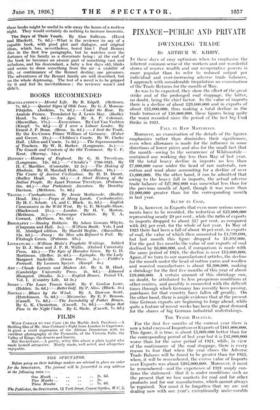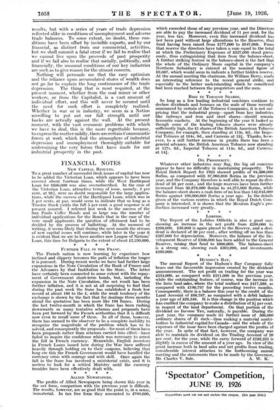FINANCE-PUBLIC AND PRIVATE
Ix these days of easy optimism when to emphasize the inherent common sense of the workers and our wonderful stores of reserve wealth and our recuperative powers is more popular than to refer to reduced output per individual and ever-increasing adverse trade balances, I approach with considerable trepidation an examination of the Trade Returns for the month of May.
As was to be expected, they show the effect of the great strike and of the prolonged coal stoppage, the latter, no doubt, being the chief factor. In the value of imports there is a decline of about £23,000,000 and in exports of about £25,000,000, thus making a total decline in the trade turnover of £48,000,000, these figures being quite the worst recorded since the period of the last big Coal Strike in 1921.
FALL IN RAW MATERIALS. - Moreover, an examination of the details of the figures emphasizes rather than diminishes their significance, even when allowance is made for the influence in some directions of lower prices and also for the small fact that the month-owing to the occurrence of Whitsuntide-- contained one working day less than May of last year. Of the total heavy decline in imports no less than £7,000,000 came under the head of raw materials, raw cotton and wool alone accounting for a decline of over £4,000,000. On the other hand, it can be admitted that owing to the heavy fall in imports, the actual adverse trade balance of £27,902,000 was somewhat less than for the previous month of April, though it was more than £2,000,000 greater than for the corresponding month in last year.
SLUMP IN COAL.
It is, however, in Exports that even more serious move- ments have to be recorded, the reduction of 225,900,000 representing nearly 29 per cent., while the ratio of exports to imports dropped to about 551 per cent. as compared with 58i per cent. for the whole of last year. In May of 1925 there had been a fall of about 40 per cent. in exports of coal, the value of which then amounted to £4,799,000, but last month this figure dropped to £1,392,000. For the past five months the value of our exports of coal declined by £6,000,000, and, if comparison is made with the same period of 1924, the decline is over E15,000,090: Again,-if we turn to our manufactured articles, the decline for the month under the head of cotton yarns and woollen and worsted manufactures is about £6,500,000, making a shrinkage for the first five months of this year of about £19,000,000. A certain amount of this shrinkage can, no doubt, be attributed to less prosperous conditions at other centres, and possibly is connected with the difficult times through which Germany has recently been passing, purchases for that country have fallen off greatly. On the other hand, these is ample evidence that at the present time German exports are beginning to forge ahead, while quite a feature of recent weeks has been the great demand for the shares of big Gerthan industrial undertakings.
THE TRADE BALANCE.
For the first five months of the current year there is now a total excess of Imports over Exports of £161,000,000. This figure, it is true, is about £5,000,000 better than for the corresponding period of last year but it is £42,000,000 worse than for the same period of 1924, while, in view of the continuance of the coal stoppage, there is every reason to fear that when the year closes the Adverse Trade Balance will be found to be greater than for 1925, when, it will be remembered, the excess value of Imports over Exports was -about £395,000,000. Moreover, it must be remembered-and the experience of 1921 amply con- firms the statement-that it is under conditions such as- the present that we lose markets - for coal and for other products and for our manufactures, which cannot always be regained. Nor must it be forgotten that we are not dealing now with one yeifr'S exceptionally unfavourable results, but with a series of yews of trade depression reflected alike in conditions of unemployment-and adverse trade balances. To some extent, no doubt, these con- ditions have been offset by invisible exports, and by our financial, as distinct from our commercial, activities, but we shall commit a fatal error if we fail to realize that we' cannot live upon the proceeds of past prosperity and if we 'fail also to realize that socially, politically; and financially, the unsound, conditions of our key industries are such as to give reason for the utmost concern. Nothing will persuade me that the easy optimism and the reliance upon accumulated stores of wealth does not go far to explain the long continuance of the trade depression. The thing that is most required, at the, present moment, whether from the coal miner or other workers, or from the Capitalist, is a vast amount of individual effort, and this will never be secured until the need for such effort is completely realized. Whether in war or in industry, we seem as a Nation unwilling to put out our full strength until our backs are actually against the wall. At the present moment, with the vast economic problems with, which we have to deal, this is the more regrettable because, to express the matter mildly, there are certain Communistic forces at work which find the atmosphere of industrial depression and unemployment thoroughly suitable for undermining the very forces that have made for our industrial prosperity in the past.











































 Previous page
Previous page